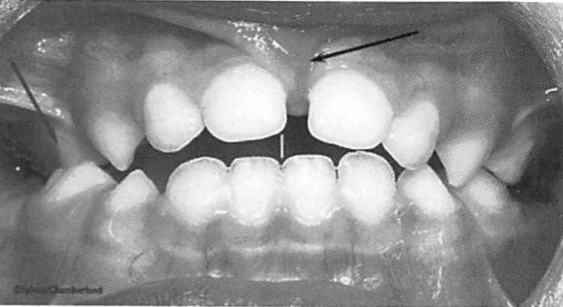Excessive thumb-sucking and pacifier use can put your child’s dental health at risk. Learn how and what you can do about it below
Of all the things that babies do, thumb-sucking has got to be one of the cutest.
Newborns instinctively suck on their fingers (most often the thumb) for a couple of different reasons:
- It’s an urge that helps with the feeding process
- It soothes them and helps them feel secure
Understandably, thumb-sucking and pacifier use often become a habit as a result.
But once a child’s permanent teeth start coming in, continued sucking can have a negative impact on their dental health.
If you have a newborn or young child, you want them to grow up with a healthy smile. So, it’s essential to understand how these habits can affect them and what you can do to help your little one grow out of them on time.
Follow along as we go over everything you need to know about thumb-sucking and pacifier use, including when your child should break these habits, what can happen if they don’t, and the best steps to help them stop.
A Totally Natural Reflex
As we mentioned above, sucking on thumbs and pacifiers are completely normal things for babies and young children to do.
It can even happen while a child is still in the womb!
If they need to wind down for bed at night, popping a thumb in their mouth is often just the ticket. It’s relaxing, comforting, and can help them get to sleep easier.
And if you’re a new parent, we don’t have to tell you how powerful a pacifier can be. They’re the weapon of choice when it comes to combating fits and tantrums.
But as their caregiver, knowing when enough is enough can help you protect their dental health and encourage the growth of a healthy smile.
When Should My Child Stop Sucking Their Thumb/Using a Pacifier?
Most often, children will naturally grow out of their thumb-sucking or pacifier habit anywhere from two to four years of age. This is usually around the time their permanent teeth start coming in.
Of course, every child is different; some may get their adult teeth sooner than others.
That’s why it’s important to keep a close eye on their dental health, so you’ll know if and when it’s time to intervene.
If your child is still using a pacifier or sucking their thumb at three to four years old, but they don’t have any permanent teeth yet, then there’s no need to be concerned about any lasting issues.
But now that you know the natural age range, you can use your best judgment and start weaning them off once they approach the upper limit.
If you’re unsure whether it’s time to start breaking the habit, you can always talk to your San Diego dentist for advice.
How Can The Dangers of Prolonged Thumb-Sucking & Pacifier Use Affect Their Dental Health?
Unfortunately, if your little one doesn’t kick these habits before their permanent teeth come in, it can create developmental, alignment, and Cosmetic Dentistry Cary issues for their smile.
Continued sucking places abnormal force on the adult teeth as they’re trying to grow in properly. This undue pressure not only affects the alignment of your child’s teeth, but also interrupts their jaw development.
Most commonly, prolonged pacifier use and thumb-sucking cause the following alignment issues:
- Posterior Crossbites – As the name suggests, posterior crossbites occur in the back teeth or molars. This issue happens when the back teeth are angled towards the tongue, with the upper molars positioned at a sharper inward angle than the lower molars. You can see what a posterior crossbite looks like in the pictures below.
- Anterior Open Bites – Anterior open bites affect the front teeth, causing them to angle outwards. Misalignment like this can create gaps and make it so that your child’s front teeth don’t touch each other when their mouth is closed. See the pictures below for reference.
- Flared Anterior Teeth – The constant outward pressure that sucking creates can cause your child’s front teeth to “flare” outwards, as seen in the pictures below.

Left arrow: Posterior crossbite. Center arrow: Anterior open bite.

A: Posterior crossbite with flared front teeth. B: Anterior open bite. C: Posterior crossbite with flared front teeth.
As you can imagine, alignment issues like these can make it challenging for your little one to bite down and chew. Not only that, but with flaring and gaps in their front teeth, they may find it hard to speak properly as well.
We’d love to say the issues stop there, but unfortunately, they don’t.
To top it all off, posterior crossbites can put a lot of extra stress on their rear teeth, potentially leading to fracturing and even tooth loss.
There are orthodontics and dental restorations that can help fix many of these problems if they do occur.
But as a parent, you want your little one to enjoy a childhood free of dental health issues. Most importantly, you want their smile to last a lifetime.
So, what can you do to help them break the habit?
How Do I Help My Child Stop Sucking Their Thumb/Using a Pacifier?
As a parent, you can help your little one grow out of these habits at home by weaning them off and using plenty of encouragement and positive reinforcement.
First off, it’s important to note that it’s easier to wean a child off using a pacifier.
So, whenever you notice your child sucking their thumb at home, make sure to offer them a pacifier instead. Following it up with a positive talk about why you’re helping them stop the behavior can be a big help too.
Remember, do your best to be patient, understanding, and gentle during this process. It will take some time, and reprimanding them or trying to change their behavior when they’re stressed out can do more harm than good.
If you notice they tend to suck their thumb in response to stress, take some time to learn what triggers the behavior and take steps to ease their mind.
If they get nervous before going to daycare or preschool, try giving them some extra affection and reassurance whenever you drop them off.
If your little one turns to thumb-sucking for comfort throughout the day or at bedtime, having a favorite blanket or stuffed animal to hug can be the perfect replacement.
Many times, your child may not even notice they’re doing it, and all it’ll take is a quick reminder to stop.
Watch your little one closely and use your best judgment as you go through this developmental stage with them.
Ideally, you’ll want to begin this process before their adult teeth start coming in. If they’re still sucking their thumb and using a pacifier past that point, talk with your San Diego dentist as soon as possible.
They can closely monitor your child’s dental health and help positively reinforce the importance of breaking these habits.
Your San Diego Family Dentist
When it comes to thumb-sucking and pacifier use, early intervention at home combined with expert care from a family-friendly professional is the best solution.
If you’re concerned about your child’s dental health, having a family dentist is crucial.
Not only can it save you the time, money, and hassle of having multiple dentists, but it can also provide your little one with the positive and uplifting environment they need to create good habits at home.
At Dental Express in San Diego, many of our doctors are moms and dads themselves and have decades of experience helping point loma children’s dentistry build healthy relationships with dental care.
We understand what it takes, and we’re committed to helping you and your family get there.
Contact our offices by phone today or set up an appointment online. Your little one deserves a healthy smile!
Keep Reading
Tooth Fairy 101: How to Get Your Kid Excited About Dental Care
Healthy Oral Habits for Children’s Dental Health Month

